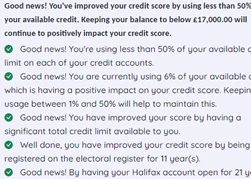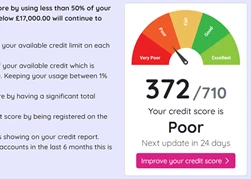Understanding Your Credit Report Sections: What Lenders Look For

20th Jun 2025
When applying for credit in the UK—whether it’s a mortgage, credit card, personal loan, or car finance—lenders will almost always review your credit report. Understanding your credit report sections is essential for knowing how your financial background is being assessed and how you can improve your chances of approval.
Let’s break down each key section of a credit report and what lenders look for.
1. Personal Information
This section contains your full name, date of birth, and current and previous addresses. It may also show whether you’re on the electoral roll at your current address.
Why it matters:
Lenders use this information to verify your identity and confirm that your details match their records. Being on the electoral roll can positively influence your score, as it shows stability.
2. Account Information (Credit Commitments)
This is one of the most important credit report sections. It lists all your open and closed credit accounts, including loans, credit cards, mortgages, and finance agreements. Each entry will include:
-
The name of the lender
-
The type of account
-
Your credit limit or loan amount
-
Your current balance
-
Payment history and status
What lenders look for:
Lenders want to see a consistent history of on-time payments, low credit utilisation, and responsible management of credit over time.
3. Public Records
This section shows any adverse financial information registered in the public domain, such as:
-
County Court Judgements (CCJs)
-
Bankruptcies
-
Individual Voluntary Arrangements (IVAs)
-
Debt Relief Orders
Why it matters:
These negative marks can significantly reduce your chances of approval. Lenders see these as signs of financial instability or risk.
4. Search History
This part includes a list of credit searches made by lenders. These are often referred to as "hard searches" and occur when you apply for credit.
What lenders look for:
Too many recent hard searches in a short time may signal that you are in financial difficulty, which could be a red flag.
5. Financial Associations
If you’ve ever applied for joint credit (like a mortgage or joint loan), the other person’s name will appear here. Their credit behaviour can impact your creditworthiness in the eyes of lenders.
Tip:
Make sure you are not financially linked to someone who has poor credit, unless necessary.
Why Knowing Your Credit Report Sections Matters
Understanding the different credit report sections can help you maintain a healthy credit profile. Regular checks allow you to spot and fix errors, monitor your progress, and stay aware of how lenders see you.
At CreditCheckOnline.co.uk, we provide helpful resources and guides to empower you with better credit knowledge and tools to manage your financial health.
Don't risk missing
something important
Access a comprehensive credit report
that includes detailed data from TransUnion
View your credit score for only £1.95.
You can view it for 1 month, after which it will be £14.95 per month unless cancelled.
See How You Score

See How You Score
An Independent View Of Your Credit Score
Lenders typically use their own systems to calculate your Credit Score based on the information in your Credit Report, often checking with one or more Credit Reference Agencies. Your Credit Check Online Credit Score is derived from all the Credit Report information we gather from TransUnion, helping you understand how you might be assessed when applying for credit.

Understand What is Affecting Your Credit Score
Quickly see how the details in your Credit Report influence your Credit Check Online Credit Score, both positively and negatively. This clear overview helps you identify areas for improvement and better understand the factors that lenders consider when assessing your creditworthiness.
View your credit score for only £1.95.
You can view it for 1 month, after which it will be £14.95 per month unless cancelled.